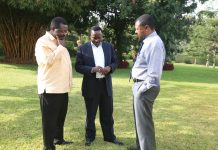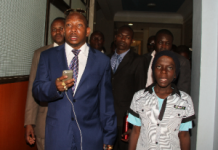Majority rule is often listed as a characteristic of democracy… it allows for political minorities to be oppressed by the ‘tyranny of majority’ in the absence of legal protection of individual or group rights.
BY THOMAS KARIUKI
@njoroge19
The year 2010 is a tender one to remember, if the events that presumed these glorious moments in the rebirth of Kenya’s history are anything to go by. In the mind of the common man, life has also taken a redefinition, a new meaning; the jostle mentality is leisurely fading away. A disposition of ardent hope hovers with it a sense of newness, the rebirth of a country, newfangled culture and resolute expectations of a better life in the days to come.
Tossing mud on infant optimism in the name of novel democracy; certainly equal rights and power to and by the people.
A question therefore begs, is the spirit and object of democracy as envisaged in the constitution alive or are we operating in a democratic husk?
The natal of the devolved system; bringing the village closer to the national government to share in the national cake, inclusivity is among the triumphs that one can cite.
However, Kenyans may well agree that most counties have lost the call and appear to be cash cows which everyone hopes to exploits, just for a sip of the elusive ‘bull-milk.’ From wheelbarrows at a cost of Sh109, 000 each, to a facebook account worth Sh2 million, multi-million shillings gates, a Sh5 million ‘worthy’ trip to know more on athletics and Sh7million curtains all at the expense of striking nurses, deteriorating health services, a county leadership that enjoys trips abroad and the most recent the grand faceoff between teachers and their employer.
Kofi Annan on September 15 at the International IDEA in Stockholm, while addressing the world on Democracy: Achievements and Challenges in the last 20 years and prospects for the future warned about four possible future threats to democratic principles.
He started by saying that we are living in uncertain times, quoting Antonio Gramsci, who said that “The crisis consists precisely in the fact that the old is dying and the new cannot be born.”
“Violent conflict is on the rise again, triggering a historic movement of people; a huge humanitarian drama that challenges our collective conscience,” Mr Annan added, “The world economy has yet fully recovered from the 2008 financial crisis. Economic inequality is deepening. Pandemic threatens the health of entire regions.”
Mr Annan also cautioned that the greatest danger is the seeming inability of leaders and institutions of democratic governance to effectively respond to these threats. As a result, faith in democracy itself is eroding, and many are looking for facile alternatives.
In a liberal democracy, power is subject to the rule of law and moderated by a constitution or laws that emphasize the protection of the rights and freedoms of individuals.
According to political scientist Larry Diamond, democracy consist four key elements;
- A political system for choosing and replacing the government through free and fair elections.
- The active participation of the people as citizens in politics and civic life
- Protection of the human rights of all citizens
- A rule of law in which the laws and procedures apply equally to all citizens.
Majority rule is often listed as a characteristic of democracy. Hence, it allows for political minorities to be oppressed by the “tyranny of the majority” in the absence of legal protection of individual or group rights.
Outlining the challenges that threaten democracies, Mr Annan said that the rapid changes in the whole order consequent on rapid globalization and regional integration has produced unparalleled economic opportunities but also created an impression that democratically elected governments no longer control the forces that shape people’s lives.
Mr Annan similarly held that elections are the heart of democracy. However they have failed to peacefully adjudicate political competition and manage transfers of power. “And without legitimacy, a government’s rule is likely to be fraught and contested.”
He contested that the role of money in politics is another source of concern as it greatly skews democracy and undermines the integrity of electoral processes, both in established and fledging democracies.
“Opaque political finance robs democracy of its promise of political equality,” he said, “unregulated or undisclosed campaign funding enables special interests to usurp the political process; worse, it may permit organized crime to penetrate the political arena.”
Mr Annan also said that while creating wealth on an unprecedented scale, globalization is also creating social dislocation and heightened inequality. The growing disparity in incomes and standards of living that result make it harder and harder for societies to chart a shared vision of the future, he added.
The lack of respect for human rights is also a challenge to democracies.
Several weeks ago, religious leaders condemned alleged ongoing killing of Muslim men which they said are “officially authorized at the highest levels as part of a government policy to kill”
On his official twitter page, Senior Counsel Ahmednasir Abdullahi representing families of the victims said that extrajudicial killings of Muslim men in Kenya had now met the test of crimes against humanity.
He said that a senior retired police officer during the Kibaki government has been appointed by the present rule as head of a special unit in charge of extrajudicial killings of Muslims.
Separately, Kaya elders voiced their frustration claiming that over 50 youths suspected to be members of the Mombasa Republican Council, MRC had gone missing.
The elders said that the government had a hand in the disappearance pleading for the whereabouts of their missing youths.
Mr Annan said that healthy and sustainable societies are built on three pillars; peace and security, sustainable and inclusive development and respect for the rule of law and human rights.
He went on to quote the universal declaration of human rights which states that the will of the people shall be the basis of the authority of government; this shall be expressed in periodic and genuine elections which shall be universal and equal suffrage and shall be held by secret vote or by equivalent free voting procedures.
Mr Annan also said that regimes often prioritize security and economic growth, while human rights and the rule of law are deemed luxuries; desirable in the long term but subordinate to the immediate need for jobs and security.
“…while human beings need security and livelihoods, they also need freedom, dignity and justice,” he said.
Tending to impose one’s will on others in an insistent or arrogant manner is simply defined as domineering.
It is thus imperative to note that none of the above raised variables is less important than the other. All depend on each other; security is important for economic growth so is the progress for human dignity and the rule of law.







